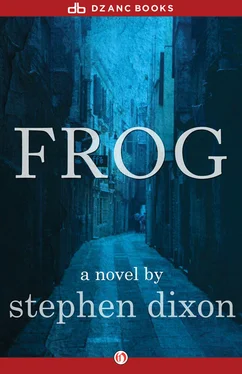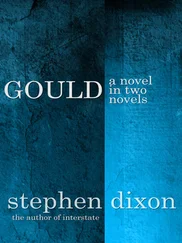Stephen Dixon - Frog
Здесь есть возможность читать онлайн «Stephen Dixon - Frog» весь текст электронной книги совершенно бесплатно (целиком полную версию без сокращений). В некоторых случаях можно слушать аудио, скачать через торрент в формате fb2 и присутствует краткое содержание. Год выпуска: 2013, Издательство: Dzanc Books, Жанр: Современная проза, на английском языке. Описание произведения, (предисловие) а так же отзывы посетителей доступны на портале библиотеки ЛибКат.
- Название:Frog
- Автор:
- Издательство:Dzanc Books
- Жанр:
- Год:2013
- ISBN:нет данных
- Рейтинг книги:5 / 5. Голосов: 1
-
Избранное:Добавить в избранное
- Отзывы:
-
Ваша оценка:
- 100
- 1
- 2
- 3
- 4
- 5
Frog: краткое содержание, описание и аннотация
Предлагаем к чтению аннотацию, описание, краткое содержание или предисловие (зависит от того, что написал сам автор книги «Frog»). Если вы не нашли необходимую информацию о книге — напишите в комментариях, мы постараемся отыскать её.
Frog — читать онлайн бесплатно полную книгу (весь текст) целиком
Ниже представлен текст книги, разбитый по страницам. Система сохранения места последней прочитанной страницы, позволяет с удобством читать онлайн бесплатно книгу «Frog», без необходимости каждый раз заново искать на чём Вы остановились. Поставьте закладку, и сможете в любой момент перейти на страницу, на которой закончили чтение.
Интервал:
Закладка:
“All those are my wife’s,” he said. “I own about twenty books and they’re all under or beside my side of the bed. I’ll keep it a secret what they are: modern poetry and fiction classics and a volume of one writer’s letters, plus The Odyssey, The Idiot, The Aeneid and Aurelius’s Meditations . I buy a lot of books, and after I’m done with them and if my wife doesn’t want to read them or doesn’t think she can in a couple of years, I give them away or, if they’re awful, throw them out. I don’t like accumulating things. For instance, when I’ve completed a fiction I dump all the drafts of it but the finished one. When the manuscript’s put into book form, out it goes too. Some writers have told me to save the manuscripts for a university library one day, but they haven’t provided me with the storage space for this old junk, nor the confidence that any library would take my work. Besides, it’d be like having my unwashed underpants there for people to study, with all the holes, stains and stretched crotch area and elastic bands. Anyway, all this shows why I don’t like being interviewed.”
“I’m sorry, I don’t catch that,” I said.
“I’m not a bright guy. Fact is, I’m dense and intellectually dumb. You can see that by what I say and how I say it. I might know my way around a typewriter keyboard when I’m alone with it, and that for sure is arguable, but just about nowhere else. Many times my five-year-old daughter can understand what I’m reading to her — a children’s book — better than I. Probably sometimes because she’s only listening when I read, while I’m speaking, so also concentrating on the delivery. I like to act out all the roles, just as I do when I write, though she prefers I read it straight with no vocal interpretations. Other times my wife and I read the same book and I have to ask her what lots of parts mean. She never does that to me and not because she’s reluctant to. Listen, in my classes I often miss the easiest things. It’s become a joke with my students. We’ll all read a student’s story, though I’ll read it three times to make sure I got it so I don’t embarrass myself. But I’ll still often misconstrue a character or scene or the entire meaning of the piece while few of them will. After I find out where I went wrong I have to slap my head and say ‘God, did it again. Stupid, stupid.’ It always gets a laugh. So why’s the school keep me on?”
“That’d seem like a good question, no offense meant, of course.”
“My front gold tooth, full head of ungraying hair that’s always parted on the left side and trimmed, neat appropriate clothing for a teacher my age, ankle bracelet I occasionally wear, my pat-on-the-back personality, mostly, plus my giddy acceptance of more work than two or three men could endure. Don’t ask me. I don’t know. So what am I saying in all this?”
“Please, I’ve no intention to interview you. As I said—”
“For instance, what could I say about those questions you sent me — can I have them back a moment?” and I gave him the letter. “They make sense, but for another writer. Stein. He and just about every writer worth his word processor can answer anything and sensibly, intelligibly, cleverly, profoundly, even if they didn’t understand or hear the question. Me? Well I’ll give you an example. ‘What’s going on in American fiction from your point of view?’ Writing, lots of writing. Short stories and novels. Some novellas. Short shorts are in. Cuffs are out again and pleats are back. ‘Is there any significant dialogue going on between writers or schools of thought that will make a significant difference?’ Sure. Yak-yak-yak. It never stops. As for the significant difference, I wouldn’t know, since the minute I hear the yakking… See? Nothing. Let’s take another.”
“Really, sir, you’ve made your point. May I have my poems back before you smudge them?”
“‘Is the American novel keeping up with the social, economical, political, religious and technological changes in American life?’ You bet it has. If it doesn’t sell it’s shredded up faster than it ever was. Truth is, I don’t give a shit about any intellectual drip or ideological current or economical river or social ocean or political or technological cesspool.”
His wife came in and said “You don’t have to get crude.”
“So I’ll say it daintier. I keep up with nothing, not even contemporary writing. No time. I father, son, husband, teacher, writer, semidetached homeowner. The little time I get for myself, I go to my cellar, shut the door. I blank everyone and everything out. I do my pages. One to two to three. They add up, spill over, get in my way, when I leave I sometimes have to kick piles of them aside. Eventually they amount to a manuscript. Small to large. When it’s done I quickly start another. My life down there’s a concatenation of fabulations. Sound good? I can’t stand those things, whatever they’re called.”
“You’re only interested in amounts?” his wife said.
“I’m interested solely in going to the cellar and shutting the door, if only for a few minutes. The messages — reasons — cause-explanations — I blow my nose on. ‘How do I fit in?’ it says here. I don’t. There’s no room. The house is overcrowded with writers and the furniture’s painted on the walls. If rooms were added to it, I’d only be told after they were filled. Not that I didn’t once try to get in, but they said I was being pushy, ‘Wait your turn… You’re stepping on my toe…. I’m holding this place for someone…. You’re too noisy and preventing people from sleeping standing up.’ I got out — I’d only made it to the foyer. ‘Ether, ether,’ I cried. But another. ‘Fabulist, minimalist, where are you?’ I’ll take the Crispy Chef’s Shrimp, not too spicy, and start off with cold Szechuan noodles. Look, I belong to no movement. If I did, I’d hold it till it was still, turn it around from me and say ‘See the pretty birdy?’ and run in the opposite direction.”
His wife said “Come on, people are interested in backdrops. Why not be slightly gracious and even informative for once, and not a hypocrite. For you yourself read the Joyce biography, was involved in the Beckett one till you lost it, and carried Kafka’s when we went to Prague.”
“Only for the maps,”
“Try. I might even learn something about what you do.” She took the letter from him and read “In what traditions do you think your work follows?’”
“My dad’s. He said ‘Every day is labor day’”
“‘Do you feel like an American writer?’”
He started waving an imaginary flag, dropped it, picked it up, kissed it, said “Pheu!” and pretended to spit. “What’re they making these things out of lately? Tastes so artificial.”
“‘A New York writer?’”
“Turdy-Gurdy and Merde Avenue. I says, what, what?”
“‘Explain the phenomenon of being so widely published and yet still kind of struggling for recognition.’”
“Keeps my weight down, muscles toned, body in fighting condition, so is among the best things to have happened to me.”
“‘What’s your relation to the New York publishing scene?’”
“I walk past their buildings sometimes when I’m in New York. They dwarf me.”
“‘Why do you publish with the small presses and small mags?’”
“Unlike the biggies, they haven’t learned yet how to avoid me.”
“‘Where and how did you begin publishing?’”
“OK, a serious question, so rates a serious response. Hold your pantyhose, folks. Someone sent one of my early stories to a fancy quarterly. They took it and wanted to see me immediately about a few minor changes before they sent the issue to the printer’s. I went to their office. It overlooked the East River, tugboats going past, hamper factory standing still, sunken living room, framed photos of contemptuous lit lights on the grand piano, an opened bar. ‘No thanks,’ I said. I was on my lunch hour from a news job I had and still never touch the stuff till sundown. It ended up where they wanted a total rewrite. I rewrote the story totally and they said they wanted a total rewrite of the rewrite. I rewrote the rewrite totally and they said they wanted a total rewrite of the rewrite of the rewrite. I decided they’d never publish this poor five-page story of a New York merry-go-round and sent them the original draft. Never heard from them again and six months later that draft was published. I learned almost all I needed to know about editors and publishing from it.”
Читать дальшеИнтервал:
Закладка:
Похожие книги на «Frog»
Представляем Вашему вниманию похожие книги на «Frog» списком для выбора. Мы отобрали схожую по названию и смыслу литературу в надежде предоставить читателям больше вариантов отыскать новые, интересные, ещё непрочитанные произведения.
Обсуждение, отзывы о книге «Frog» и просто собственные мнения читателей. Оставьте ваши комментарии, напишите, что Вы думаете о произведении, его смысле или главных героях. Укажите что конкретно понравилось, а что нет, и почему Вы так считаете.












